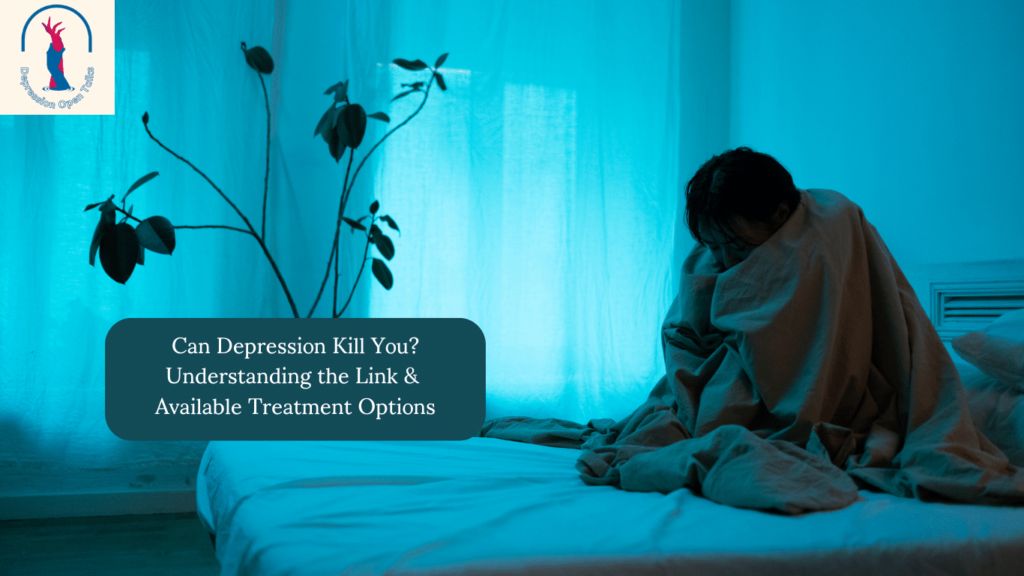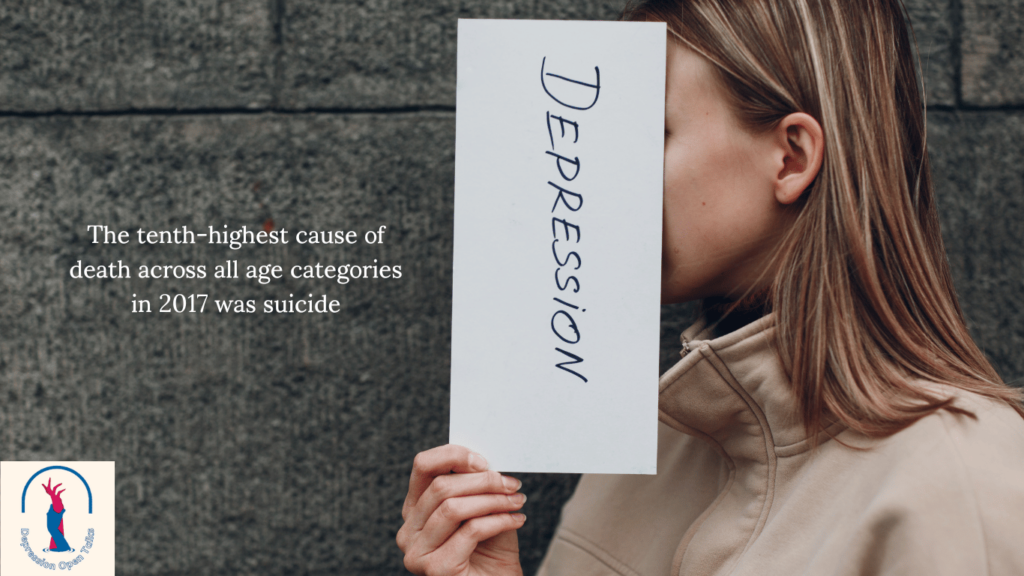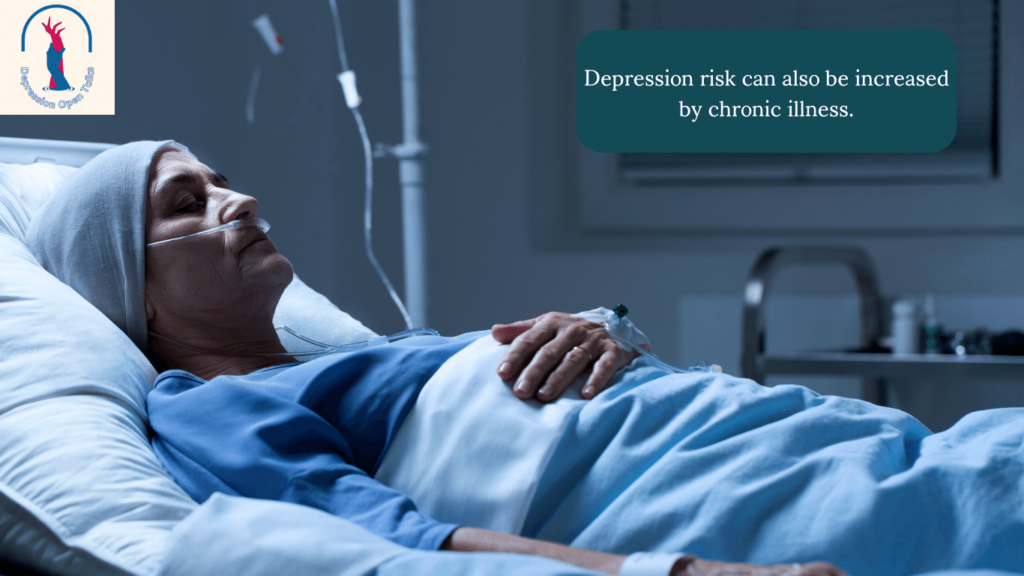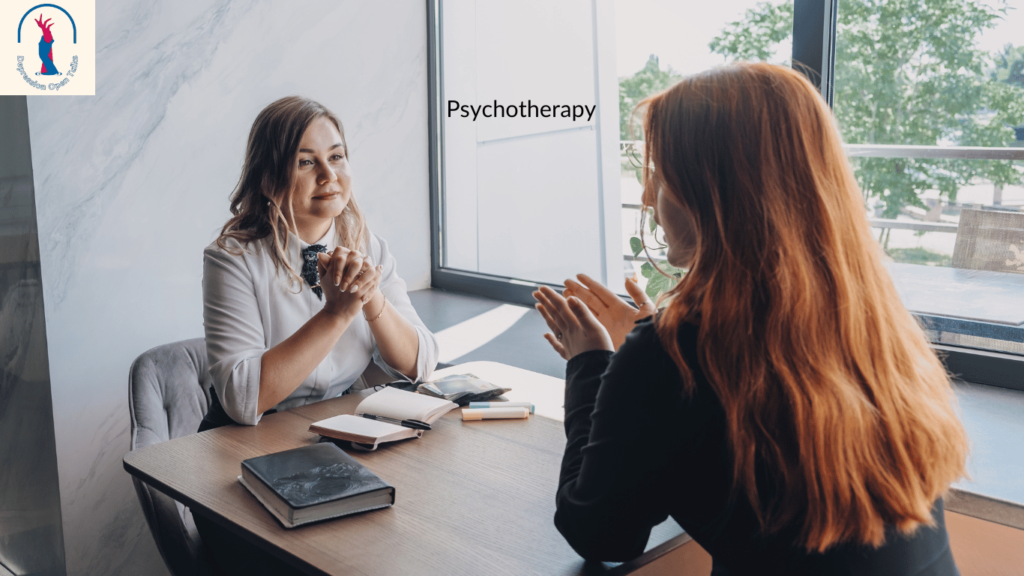Can depression kill you? Is depression a deadly condition? Find out the link between depression and mortality, and explore the available treatment options for managing depression. Learn about therapy, medication, and lifestyle changes that can help you overcome depression and improve your overall wellbeing. Gain a deeper understanding of this often-misunderstood condition and find hope in the journey towards healing with Depression Open Talks.
Many depressed persons discover therapy programs that enable them to lead happy, satisfying lives. Although the majority of people strive to achieve that, some unhappy individuals believe there is no chance. Some researchers believe that depression is a killer disease since some people who have it pass away. They believe that the only solution to their issues is suicide. Can depression lead to death? The outlook is significantly better with treatment, and we can assist.
How can depression kill you?
Can depression kill you? According to research, depression is associated with a shorter life span. A 2017 study looked at 293 papers that found a connection between depression and found a 50% rise in mortality. Depression is stronger when someone is currently depressed and becomes weaker over time.
A depressed individual may, in extreme circumstances, also think about suicide. Additionally, they might turn to drug abuse as a form of self-medication, which is fatal.

You might think it’s pointless to get help for your depression. The sooner you begin treatment, however, the sooner you will be able to manage your symptoms because depression can have major psychological and physiological effects.
Depression-related Suicide Statistics
The tenth-highest cause of death across all age categories in 2017 was suicide, according to the CDC. Nearly 45,000 deaths in the United States in 2016 were linked to suicide.
In 2020, almost 21 million Americans, or 8.4% of all adults in the country, had at least one major depressive episode. Between 5% and 8% of those who suffer from serious mental illnesses like depression may commit suicide.

Fortunately, treatment for any underlying mental health disorders, according to the American Foundation for Suicide Prevention, can reduce this risk. If you think someone is in urgent danger of hurting themselves or someone else:
- Call the National Suicide Prevention Lifeline at 800-273-8255, or text “HOME” to 741741 to contact the Crisis Text Line.
- Until aid arrives, ask someone to stay with you.
- Remove any potentially harmful weapons or substances.
- If you believe someone is in immediate danger and you can’t get to them, call 911 or a local crisis hotline. Caution should be exercised before dialing 911.
Related health problems
Numerous different physical and emotional symptoms can accompany depression. Your physical health may be impacted by these and other problems that may follow. These issues can occasionally become so serious that they pose a risk to life.
Depression risk can also be increased by chronic illness. In some circumstances, this might be because a person is more likely to suffer depressive symptoms when dealing with stress related to their illness. Some medical illnesses, including Parkinson’s disease and stroke, can alter the brain in ways that exacerbate depression.

The National Institute of Mental Health reports that depression can be widespread in people with conditions like cancer, Alzheimer’s disease, HIV/AIDS, stroke, and diabetes. According to research, depression can make it more difficult to treat coexisting disorders since it’s more difficult to follow a treatment plan when you’re experiencing emotional distress.
Additionally, depression seems to increase the risk of developing specific diseases like heart disease. When taken together, these factors may increase a person’s chance of dying from their medical condition more than it otherwise would if they did not have depression.
Although it is unclear if one causes the other or vice versa, research indicates that those with depression are considerably more likely to develop diabetes. According to one study, people with significant depression and diabetes—whether or not they have heart disease symptoms—had more cardiovascular risk factors than people without these conditions.
Examining the relationship between depression and other medical disorders still needs more study. One theory is that those who suffer from depression may find it more challenging to maintain their health and may have less access to medical care. It could also be due to physiological modifications including elevated inflammation and changes in stress hormones.
A diminished appetite
If you have depression, you might not feel as hungry as usual and lose weight unintentionally. Alternatively, you might notice a rise in your appetite for certain foods, particularly comfort foods. You can overeat as a result of this, putting on weight.
Several health issues can result from eating improperly, whether it entails eating too little or unhealthily. According to research, poor diets may have had a factor in up to 22% of adult fatalities in the United States in 2017. According to several studies, shortages in certain nutrients, such as amino acids, B vitamins, omega-3 fatty acids, and minerals cause depression.
Sleeping problems
Depression frequently manifests as insomnia, restless sleep, or excessive sleeping. Chronically getting poor sleep increases your chances of significant health issues like obesity, diabetes, and heart disease.
Substance use disorder (SUD)
Some people may use drugs or alcohol to self-medicate their emotional issues as a result of depression. When people are unable to handle or manage unpleasant emotions like melancholy, loneliness, rage, hopelessness, and tension, this may happen more frequently.
Depression is one of the numerous mental health illnesses that frequently co-occur with SUD. About 25% of those who have a major mental illness are also thought to have SUD.
It is referred to as a dual diagnosis when a person has both a drug use disorder and depression at the same time that they develop an unhealthy dependence on these substances.
According to the National Institute on Drug Abuse, alcohol, tobacco, and illegal drug usage are responsible for one out of every four fatalities in the country. Plus, substance abuse is one of the major risk factors for suicide.
How can you treat depression to save yourself?
It suggests that going into remission from depression lowers the likelihood of dying young. Remission can result from therapy or it can happen on its own. Some of the typical therapies for depression include:
Psychotherapy
One method of treating depression over the long term is psychotherapy (talk therapy). It entails consulting a specialist about your depression and any associated medical conditions. Psychotherapy can be approached in a variety of ways, such as cognitive behavioral therapy (CBT) and interpersonal therapy.
A 2020 study found that up to 62% of persons receiving psychotherapy for depression eventually stop meeting the diagnostic criteria for severe depressive disorder. When CBT is used as a psychotherapy, the success rate rises to 66%.

Therapy is typically conducted in person in a psychologist or psychiatrist’s office. Additionally, you can now get counseling on the phone or online. You can choose the therapy method and format that work best for you with the assistance of your mental health practitioner. Among the objectives of psychotherapy are:
- identifying any opposing thoughts or behaviors you may have and replacing them with more wholesome, constructive ones.
- finding healthier methods to address and resolve life’s issues.
- looking more favorably towards your interactions with others and events in life.
- learning a healthier method to deal with the sadness and misery in your life.
- acquiring the ability to make more practical life objectives.
Medication
According to a 2020 study, 54% of persons who take this treatment have a 50% reduction in depression symptoms after taking antidepressant medication. Sometimes therapy is insufficient to aid a person in overcoming their depression. A mental health practitioner may suggest medication in certain circumstances. The main objective of using medication is to reduce the symptoms of depression so that a person is more open to the advantages of therapy.
Self-Help Strategies
Making healthy decisions in life, including eating well and exercising, can improve your mood and lessen the effects of depression. One study in 2021 found that little exercise may be sufficient to lessen some signs of depression. Physical activity can make you feel better, whether you go for a walk around your neighborhood, work out a little at home, or even start moving by doing housework or yard work.
Try to include a fun and meaningful activity in your daily routine. If you like sports or travel, for instance, you might like reading a book on such things.
Another study conducted in 2022 found that following a Mediterranean diet can reduce the likelihood of experiencing moderate-to-severe depressive symptoms by up to 45%. You can control your depression symptoms at home with self-help techniques. Your brain can get the nutrients it needs to function at its best by eating more nutrient-dense foods.
Along with more conventional treatments, stress management techniques like meditation can be supportive in easing the symptoms of depression. Reduced inflammation, increased brain gray matter, and mood management via vagus nerve stimulation have all been linked to meditation as advantages.

A common feeling during a depressive episode is loneliness. At this point, it’s critical to ask for assistance. “Hey, I’m feeling awful right now; Do you have a moment to talk?” Another option is to start the discussion with a “how are you?” and then gradually open up as the conversation progresses.
💗 Learn more potential depression treatment options via our depression treatment compilation.
Can depression kill you: Key takeaway
In conclusion, depression can indeed have serious consequences, including an increased risk of mortality. However, with the right treatment and support, it is possible to manage depression and improve your overall health and wellbeing. There are several treatment options available, including therapy, medication, and lifestyle changes, and it is important to find the approach that works best for you. Remember, seeking help is a sign of strength, and there is no shame in reaching out for support when you need it. With the right resources and support, you can overcome depression and live a fulfilling and happy life.
References
Boland, M. (2022, January 25). Depression and Early Death: Is There a Link? I Psych Central. Psych Central. Retrieved May 8, 2023, from https://psychcentral.com/depression/depression-kills
Safai, Y. (2018, May 24). Can Depression Kill You? Health Effects of Untreated Depression. Healthline. Retrieved May 8, 2023, from https://www.healthline.com/health/can-depression-kill-you
Schimelpfening, N. (2022, December 6). Can Depression Kill You? Verywell Mind. Retrieved May 8, 2023, from https://www.verywellmind.com/can-depression-kill-you-1067514






